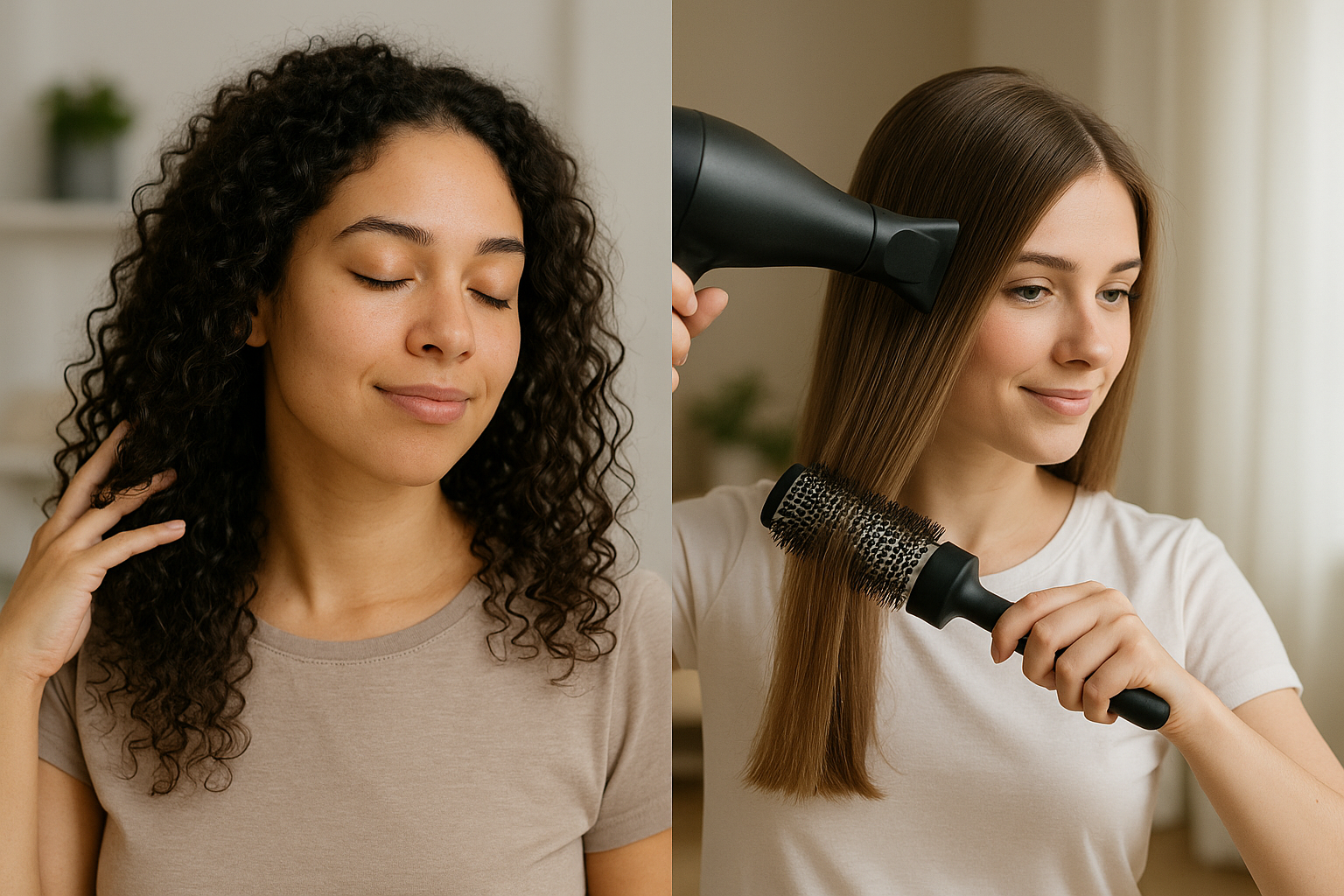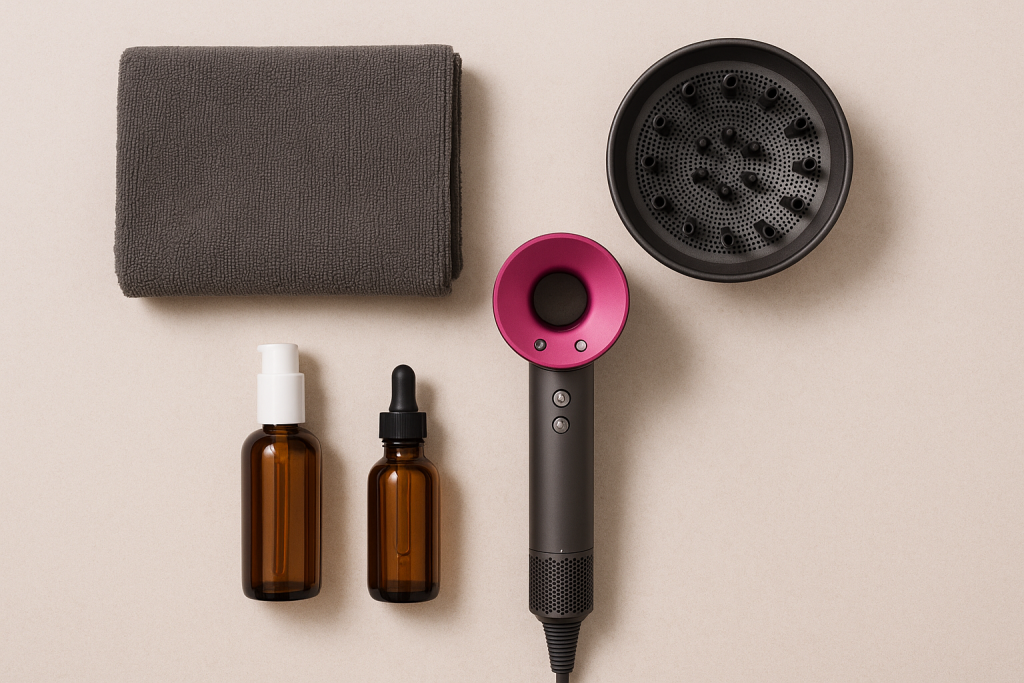
1. The Big Debate: Air-Drying vs Blow-Drying
If you’ve ever wondered whether it’s healthier to let your hair air-dry naturally or blow-dry it quickly, you’re not alone.
It’s one of the biggest daily decisions — and surprisingly, the “healthier” choice depends on your hair type, climate, and routine.
💬 Curly hair tends to thrive with air-drying, while straight hair benefits from strategic blow-drying.
The secret? It’s all about balance — using the right method, the right way, at the right time.
📎 External DoFollow Link: Healthline – Is Air-Drying Better for Your Hair?
2. How Heat and Air Affect Each Hair Type
Curly Hair
- Air-Drying: Encourages curl definition and bounce, but in humid weather can cause frizz.
- Blow-Drying: Best when using a diffuser on low heat — adds volume while controlling frizz.
Coily Hair
- Air-Drying: Takes long and may cause shrinkage or uneven drying.
- Blow-Drying: Works better with stretch methods or warm airflow to prevent tangling.
Wavy Hair
- Air-Drying: Creates soft, natural waves but can lose shape easily.
- Blow-Drying: Boosts body when done upside-down with a cool-air finish.
Straight Hair
- Air-Drying: Keeps natural shine but may cause limpness or flat roots.
- Blow-Drying: Adds volume and a salon-smooth finish when done with round brushes.
📎 Internal Link: Read: Heat Styling Rules — What Each Hair Type Can and Can’t Handle
3. Comparison Chart: Air-Drying vs Blow-Drying Results
| Hair Type | Best Method | Time Needed | Final Texture | Risk Level | Recommended Products & Tools |
|---|---|---|---|---|---|
| Curly (3A–3C) | Air-Drying (80%) + Diffuse Finish | 30–45 mins | Defined, soft curls | ⭐⭐ | Dyson Supersonic Diffuser, SheaMoisture Curl Enhancing Smoothie |
| Coily (4A–4C) | Controlled Blow-Dry (Low Heat) | 20–30 mins | Stretched, hydrated coils | ⭐⭐⭐ | RevAir Reverse Dryer, Mielle Pomegranate & Honey Leave-In |
| Wavy (2A–2C) | Air-Drying (Towel Blot + Scrunch) | 20–25 mins | Soft waves, minimal frizz | ⭐ | Ouai Wave Spray, Microfiber Towel |
| Straight (1A–1C) | Cool Blow-Dry with Brush | 10–15 mins | Smooth, voluminous | ⭐⭐ | Dyson Airwrap, Living Proof Full Volume Spray |
💬 Note: Air-drying works best when your environment is mild. In humid GCC climates, partial blow-drying prevents frizz and buildup.
📎 External DoFollow Link: Byrdie – Blow-Dry vs Air-Dry Experts Explain
4. 5 Truths About Air-Drying vs Blow-Drying

1. Air-Drying Isn’t Always Healthier
Many believe air-drying is “damage-free,” but that’s not always true.
Wet hair is weaker than dry hair — and leaving it damp too long can cause hygral fatigue, where strands swell and weaken from excess moisture.
💡 Curly and coily hair can air-dry safely with leave-in products that seal moisture, but straight hair should avoid prolonged wetness.
2. Blow-Drying Can Be Healthier When Done Right
Using moderate heat (below 350°F / 175°C) with a protectant can actually be less damaging than constant air exposure.
Controlled blow-drying seals the cuticle faster, reducing frizz and microbial buildup.
💬 Think of it as “gentle heat therapy” rather than damage.
📎 Internal Link: Read: Signs You’re Over-Conditioning (and How It Differs by Texture)
3. Hair Type Determines Everything
Curly and coily textures need moisture retention; straight and wavy types need controlled volume.
| Hair Type | Best Drying Practice |
|---|---|
| Curly/Coily | Air-dry 70–80%, then diffuse with low heat. |
| Wavy | Use towel-blotting, then quick cold blow-dry. |
| Straight | Rough-dry upside-down for volume, then smooth ends. |
💡 Matching your method to your texture makes the biggest difference.
4. Prep Is More Important Than Method
Whether you air-dry or blow-dry, prep decides the result:
- Use a heat protectant always. (Olaplex No.9, TRESemmé Thermal Spray)
- Towel-blot gently — never rub.
- Apply lightweight oil (Moroccanoil Light) to reduce frizz.
📎 External DoFollow Link: Vogue – Hair Prep Tips Before Drying
5. Climate Makes or Breaks the Choice
In the GCC, hot and humid air can make air-drying nearly impossible — hair reabsorbs moisture and frizzes.
Partial blow-drying (especially at roots) helps seal in hydration without overheating.
In cooler climates, air-drying is safer and gives that effortless, natural texture.
📎 Internal Link: Read: Natural Oils in Daily Haircare for Curly vs Straight Hair
5. Expert Tools & Product Recommendations
| Category | Curly/Coily Hair | Wavy/Straight Hair |
|---|---|---|
| Dryer | Dyson Supersonic w/ Diffuser | Dyson Airwrap or GHD Helios |
| Heat Protectant | Mielle Leave-In, SheaMoisture Mist | Ouai Heat Protection Spray |
| Post-Dry Serum | Moroccanoil Treatment | The Ordinary Multi-Peptide Serum |
| Quick Tools | Microfiber Towel, Wide-Tooth Comb | Paddle Brush, Round Volumizing Brush |
💡 Investing in a diffuser for curly hair and an ionic dryer for straight hair is the ultimate hair health hack.
6. Climate Tips for GCC and Global Readers
In GCC (UAE, KSA, Qatar, Oman):
- Avoid full air-drying outdoors. The humidity will cause frizz and flatten volume.
- Use a blow-dryer on cool mode for the last 30% of drying.
- Apply a leave-in conditioner (Ouidad Climate Control Gel) before air exposure.
In Cooler or Dry Climates:
- Air-drying works great! Use satin scrunchies to shape natural waves or curls.
- If blow-drying, apply argan or jojoba oil before to prevent static.
- Finish with a cool shot to lock the style.
📎 External DoFollow Link: American Academy of Dermatology – Hair Drying Safety Tips
So, air-drying vs blow-drying — what works better for each type?
The real answer: it depends on your texture, routine, and climate.
✨ Curly & Coily Hair: Partial air-dry, finish with diffuser — keeps bounce and shape.
💨 Wavy Hair: Alternate both methods for soft definition and control.
🌤️ Straight Hair: Quick, cool blow-dry for volume and shine.
No method is “bad” — only the wrong one for your hair type.
Listen to your strands, protect them, and find the balance that fits your mornings.
📎 Internal Link: Read: 5-Minute Morning Styles for Curly Hair vs Straight Hair


Leave a Reply